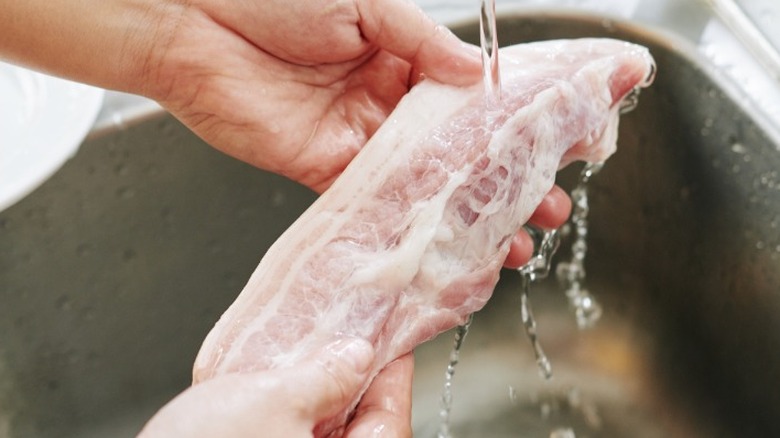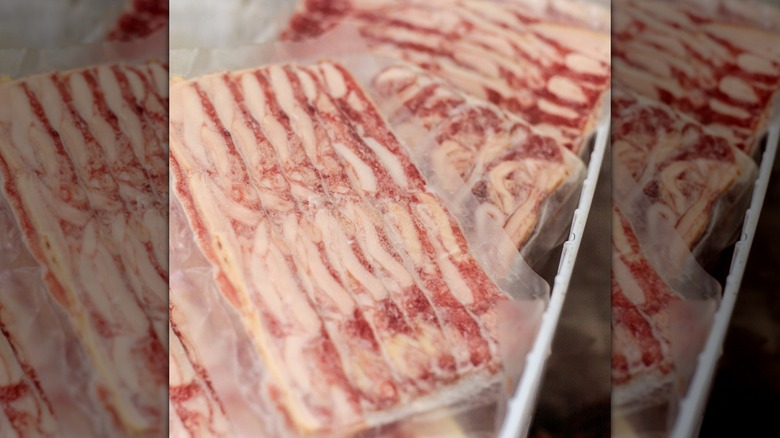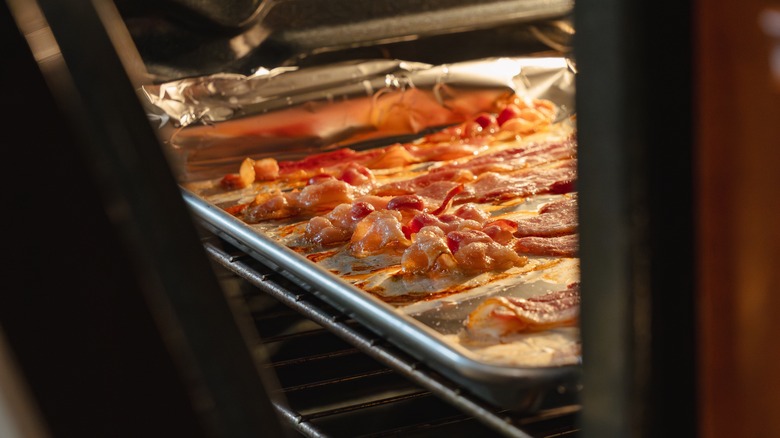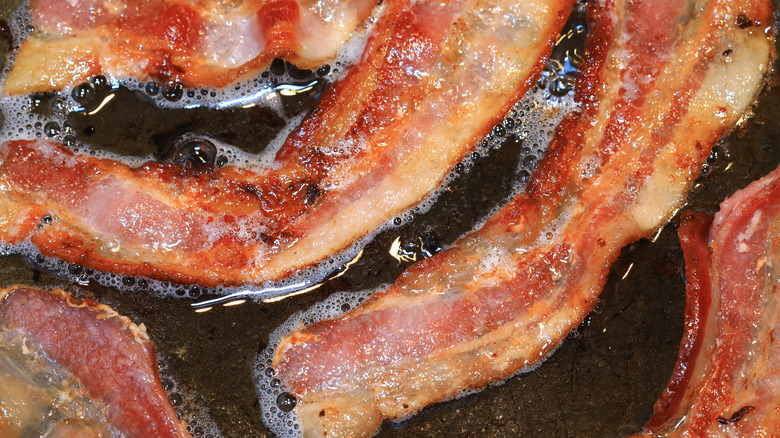Stop Rinsing Your Bacon Before Cooking
If you're on a salt-restricted diet, you might have thought about rinsing your bacon with water at least once. It's logical, right? Give it a go under the tap and voila! Less salt on the bacon's surface equals less sodium when you're eating your favorite BLT. It's a great idea in theory, but ridding your bacon of its salt content by dunking it under the water doesn't do what you think it does.
In other words, it won't make a big enough difference in the salt content for it to be worth the time you've spent rinsing the bacon. It'll still be plenty salty in the end. Chalk this up to the meat's curing process.
Bacon is typically cured in one of two ways. It's either dunked in the brine solution for a specific amount of time, or more commonly these days, the meat gets an injection of brine. Both processes push the salty brine deep into the muscle tissue of the meat. While rinsing your bacon with water may remove some of the surface salt, it'll do little to pull the salt out of the tissue where it's deeply embedded.
That said, while rinsing may remove some of the salt, it also has the potential to water down the seasonings you DO want on your bacon. Unfortunately, there isn't a separate "rinse cycle" for the spices and seasonings you want to keep as opposed to the ones you don't. Rinsing your bacon waters them both down in equal measure.
The bacteria quotient
Some people wash their bacon because they believe it will rid the meat of harmful bacteria. However, you don't need to rinse your bacon to put the kibosh on bacteria. Cooking the bacon kills off any of the bacteria lingering on the meat's surface. Moreover, the US Department of Agriculture (USDA) doesn't recommend rinsing bacon. Doing so increases the likelihood of cross-contamination because the bacteria from the bacon could get on your eggs, your French toast, or the cube of butter you have in the vicinity of the bacon while you're cooking.
The only time the USDA recommends water and bacon in the same sentence is when you're thawing the bacon in a bath of cold water. Even then, the bacon remains in the plastic wrap home that the manufacturer bestowed upon it. For safety reasons, the bacon's packaging shouldn't be punctured during the thawing process. Bacterial cross-contamination is the reason here, too, so keep the bacon wrapped up tight until you are done thawing out the raw meat.
Other reasons why people rinse bacon
So, you now know that people dunk their bacon under the tap in an attempt to get rid of excess salt or bacteria. However, there is another reason why some people resort to giving their bacon a good wash: shrinkage. Rinsing bacon in water is supposed to leave you with longer strips of bacon to enjoy — up to 50% longer, according to info on Life Hacker. While this method may make for long slabs of pork on the plate, it opens your meal up to wayward bacteria just looking for a place to land.
Fortunately, there's a less bacteria-laden way to prevent bacon shrinkage. Just cook the bacon low and slow. You'll need an oven for this cooking method. Normally, when you cook bacon in the oven, it usually goes in for about 10 minutes at 365 degrees Fahrenheit. Knock the temperature down to 300 degrees Fahrenheit and up the cooking time to 30 to 45 minutes to pull off this bacon-cooking hack. Shrinkage will be at a minimum and the bacon will still be cooked adequately, due to the longer cooking time.
What water does to the Maillard reaction
There's one last thing to consider when it comes to the bacon and water debate. Water puts a stop to the Maillard reaction in the bacon, and the Maillard reaction is why your meat turns brown when you cook it. So if you want crisp, tasty bacon, don't rinse the bacon no matter what.
The Maillard reaction doesn't commence until the temperature has hit at least 285 degrees Fahrenheit. The high temperature starts a chain reaction in the amino acids and sugars in the meat, which turns your bacon from pink to brown. If you rinse the bacon, the leftover water on the meat could cause the bacon to steam (or boil if the water accumulates in the frying pan) once the temp hits around 212 degrees Fahrenheit. When this happens, the water steams up the bacon before the browning starts. And the interior of the bacon will get done long before the surface will brown. So, for the love of crispy brown bacon BLTs everywhere, don't rinse your slabs of porky goodness at any time or for any reason.



